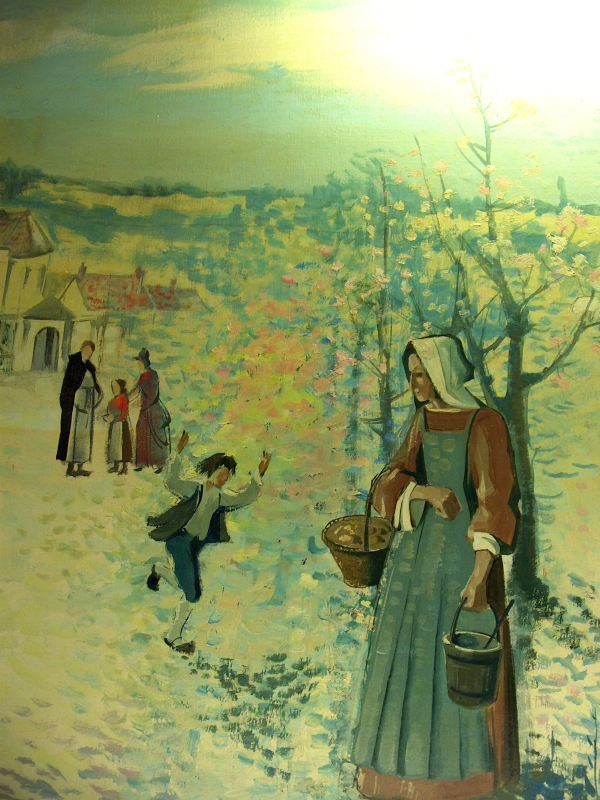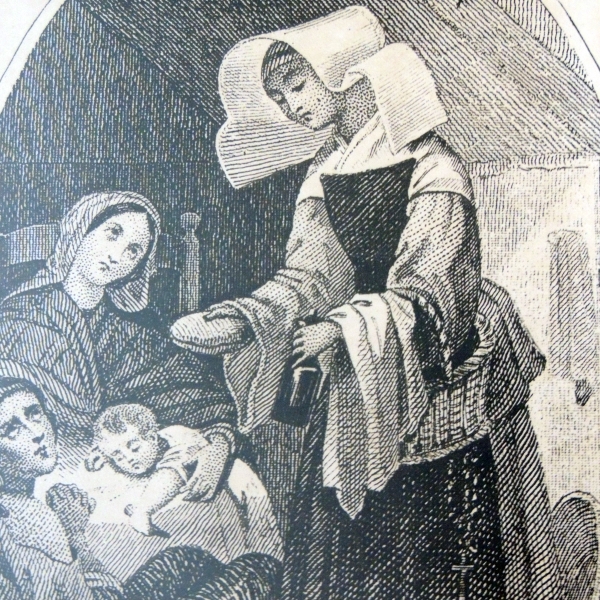“The spirit of poverty and the love of work” are Marie Poussepin’s last recommendations: “May the Community never degenerate on this point.” Our first sisters led a poor and laborious life, “without being different from the persons living in the world except for their piety and modesty of their dress.” Their poverty manifests itself by a great simplicity which, from the beginning, has characterized the Community. They hand-knit stockings to support themselves “simply, frugally, and without being a burden to anyone,” and to help the poor gratuitously, “seeking only the glory of God and the good of neighbor.”
Source: Original Vision (In the Constitutions)
 Marie Poussepin: having kept nothing for herslf, possessed nothing
Marie Poussepin: having kept nothing for herslf, possessed nothing
Renewing in us the family traits: Simplicity, Work, and Poverty
In the tradition of the Congregation, simplicity, work, and poverty are family traits inherited from our Foundress and passed on by the sisters who preceded us. Today we receive them in order to live them anew and faithfully transmit them to future generations (C 89).
The moment we are living, marked by multiple realities that have radically transformed the world—the longing for something different, the efforts to undertake new ways of living, the concrete demands of restructuring and revitalization, as well as the various implementations that challenge our knowledge, skills, and capacity to adapt—deeply questions us. It leads us to ask what is relevant and timely, what we can accomplish, and even what we are willing to undertake. How can we renew our Charism and respond to the challenges of today’s world?
It is urgent to turn our gaze back to the family traits, those that express our identity, mobilize our existence, and determine the essence of who we are and what we are willing to do with what we are.
The Constitutions ground this charismatic heritage from our Mother Foundress :
- “Simplicity, according to the spirit of the Sainville Regulations, must be in each of us a deep disposition that marks our life of prayer, the style of our communities… It expresses an attitude of humility that places us in the truth of who we are before the Lord and before others…” (R III, C 90).
This virtue touches the roots of our behaviors and attitudes towards the vocation we have received. The invitation is clear and constructive: humility that, within us, is truth, in order to foster fraternal correction and allow others to be more and better, simply because they are companions on the journey.
Prayer that is God’s presence in all our actions, readiness to contemplate Him and then to give from what we have contemplated. As our Mother Foundress, Marie Poussepin, said—yesterday in Sainville and today in the daily life of each one of us—: “Speak to Him often, speak often of Him, and frequently renew the intention to do everything for His glory” (RG).
- “For Marie Poussepin, work is a factor of human promotion at the service of charity… Work, a place of encounter with all our brothers and sisters, associates us with them in the work of creation…” (C 91).
It is about looking again at our missionary present to discover what in it is true Service of Charity. “Life grows by being given away, and it weakens in isolation and comfort” (Evangelii Gaudium, n. 10).
It is the testimony of an authentic Service of Charity, of a convincing fraternal life, that truly gives meaning to the mission we carry out. The opposite is merely an occupation, but it is not Mission. It is not the doing that makes us missionaries of the Kingdom: it is the mysticism of our being, which becomes Gospel and preaching.
For Marie Poussepin, it was her ardent Charity that moved her great heart and motivated her exodus towards the most in need. We should ask ourselves: what moves us, impels us, sends us?
- “Work must never lead us to the accumulation of riches. The sisters will not consent to stray from poverty, even in the smallest degree” (cf. R XLIII).
Placing our trust in God is what truly awakens in us the spirit of true and authentic poverty. We could say: it is the need for God, being filled with Him so that He becomes our only wealth. Thus, we discover that passage of God which, charismatically, we call the Provident God, because He is always attentive to what our life needs.
For our part, and in line with C 92, evident attitudes of detachment, dispossession, joyful readiness to share, openness to give and to give oneself to others, speak of a radical option for poverty.
True poverty frees the heart, because poor is the one who, empty of everything, is full of God. Many times we feel that what we have is not enough… and sometimes we have too much, like David before the giant Goliath, when Saul put on him his armor, his bronze helmet and his sword. David said: “I cannot walk with all this,” and he took them off (cf. 1 Sam 17:38-39).
He experienced liberation… How many things should we take off ourselves in order to free ourselves and truly be poor!
“Thus, following the example of our Foundress, who, having reserved nothing, possessed nothing, we abandon ourselves to Providence, in the joy and freedom of those whose only wealth is the Lord” (cf. Testament of Marie Poussepin).
Text: Sr. Ángela María Vélez Restrepo
Simplicity, work and poverty
 From AfricaSimplicity, a family trait, appears in the Rule of Sainville and the life of Marie Poussepin as an attitude of humility. It should identify each one of our personal and community attitudes, as well as the whole of our life. It places us in the truth of who we are in front of the Lord and others. It helps us to discover, in joy, that our strength, security and freedom come from God. It makes us value, in truth, our personal and community gifts without ostentation or fear. It encourages us to put them at the service of others.
From AfricaSimplicity, a family trait, appears in the Rule of Sainville and the life of Marie Poussepin as an attitude of humility. It should identify each one of our personal and community attitudes, as well as the whole of our life. It places us in the truth of who we are in front of the Lord and others. It helps us to discover, in joy, that our strength, security and freedom come from God. It makes us value, in truth, our personal and community gifts without ostentation or fear. It encourages us to put them at the service of others.
Love of work, applying ourselves to it with all our strength and according to our possibilities, allows us to assist the poor without burdening anyone. Negligence in this aspect has to be considered as a dangerous temptation (cf. R XXVI & XLIII). For Marie Poussepin, all the “tasks” necessary for the “good of the community” are ways of participation in the common work. They are not equal but all of them are necessary: there is no hierarchy but only complementarity among them to make life and mission possible. In Sainville free service and alms are possible, thanks to the persevering work of all the sisters. The freedom to announce the Word is not conditioned by the need to be economically dependent on those whom the Word is addressed. Missionary activities and financial means are often related today in our apostolic life. Work, poverty and resources placed in common allow gratuitous service and ensure freedom.
For Marie Poussepin all the “tasks” necessary for the “good of the community” are ways of participation in the common work
A serious and careful reflection is constantly needed. It takes into account different socio- economic contexts in which we are present so that the "Word will not be chained" and the poor could have recourse "without money, to the sources of living water" (Is 55:1). There is a close relationship between simplicity, work and poverty. The latter is expressed as detachment, sharing, gratuitousness, and surrendering into the hands of God. Thus lived, poverty awakens us to the urgencies and situations of so many people and countries; it sets into action our strength and our personal and Congregational energy.
The seriousness of our commitment should call us from the moment of our entrance into the Congregation, to learn personally and in community, how to live a poor life. Regardless of the place where we find ourselves or the responsibility entrusted to us, the evangelizing action has to be coherent with our preferential option for the poor. Our life should reflect the attitude of evangelical poverty if we are to contribute to the growth of understanding and justice among peoples and individuals.
Source: "Formation in the Congregation. Ratio Formationis"


 EN
EN  ES
ES  FR
FR 




